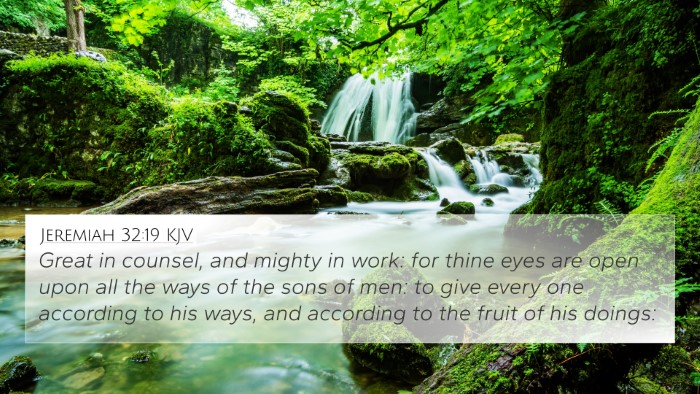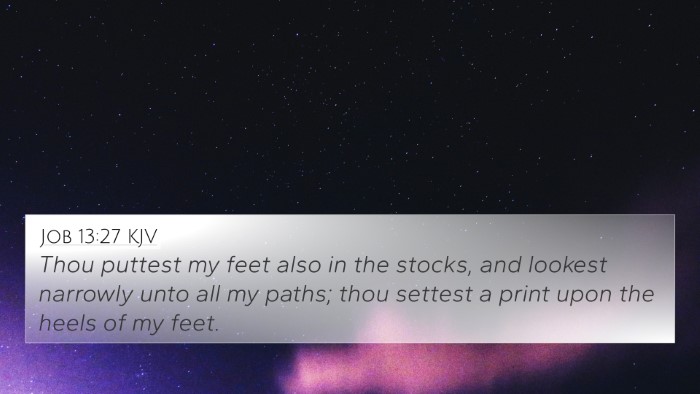Old Testament
Genesis Exodus Leviticus Numbers Deuteronomy Joshua Judges Ruth 1 Samuel 2 Samuel 1 Kings 2 Kings 1 Chronicles 2 Chronicles Ezra Nehemiah Esther Job Psalms Proverbs Ecclesiastes Song of Solomon Isaiah Jeremiah Lamentations Ezekiel Daniel Hosea Joel Amos Obadiah Jonah Micah Nahum Habakkuk Zephaniah Haggai Zechariah MalachiJob 14:16 Similar Verses
Job 14:16 Cross References
For now thou numberest my steps: dost thou not watch over my sin?
Uncover the Rich Themes and Topics of This Bible Verse
Listed below are the Bible themes associated with Job 14:16. We invite you to explore each theme to gain deeper insights into the Scriptures.
Job 14:16 Cross Reference Verses
This section features a detailed cross-reference designed to enrich your understanding of the Scriptures. Below, you will find carefully selected verses that echo the themes and teachings related to Job 14:16 KJV. Click on any image to explore detailed analyses of related Bible verses and uncover deeper theological insights.

Proverbs 5:21 (KJV) »
For the ways of man are before the eyes of the LORD, and he pondereth all his goings.

Jeremiah 32:19 (KJV) »
Great in counsel, and mighty in work: for thine eyes are open upon all the ways of the sons of men: to give every one according to his ways, and according to the fruit of his doings:

Psalms 56:6 (KJV) »
They gather themselves together, they hide themselves, they mark my steps, when they wait for my soul.

Job 13:27 (KJV) »
Thou puttest my feet also in the stocks, and lookest narrowly unto all my paths; thou settest a print upon the heels of my feet.
Job 14:16 Verse Analysis and Similar Verses
Understanding Job 14:16
Job 14:16 states: "For now thou numberest my steps: dost thou not watch over my sin?" This verse speaks to the nature of God's omniscience and the human condition regarding sin and mortality.
Verse Analysis
This verse expresses Job's deep awareness of God's watchful presence in his life, particularly regarding his actions and sins. Job recognizes that God is aware of every step he takes, implying a profound consciousness of his moral and spiritual state.
Theological Insights
-
God's Omniscience:
Matthew Henry highlights that Job is acutely aware that God knows his every action and inaction. This notion suggests that even in suffering, Job cannot escape God's knowledge of his life.
-
Awareness of Sin:
Albert Barnes emphasizes the implication of sin in Job's life. Job's plea reveals his understanding that his actions are consistently under divine scrutiny, suggesting an inherent guilt and the human struggle with sin.
-
Human Mortality:
Adam Clarke points out that this verse reflects Job's contemplation of mortality, illustrating how he feels the weight of his past sins in the face of impending death.
Cross-References
Job 14:16 relates to several key biblical texts, emphasizing similar themes. Consider the following cross-references:
- Psalm 90:12: "So teach us to number our days, that we may apply our hearts unto wisdom."
- Hebrews 4:13: "Neither is there any creature that is not manifest in his sight: but all things are naked and opened unto the eyes of him with whom we have to do."
- Proverbs 5:21: "For the ways of man are before the eyes of the Lord, and he pondereth all his goings."
- Matthew 12:36: "But I say unto you, That every idle word that men shall speak, they shall give account thereof in the day of judgment."
- Romans 2:16: "In the day when God shall judge the secrets of men by Jesus Christ according to my gospel."
- Job 31:4: "Doth not he see my ways, and count all my steps?"
- 1 Peter 3:12: "For the eyes of the Lord are over the righteous, and his ears are open unto their prayers: but the face of the Lord is against them that do evil."
- Job 13:27: "Thou puttest my feet in the stocks, and markest all my paths, and settest a print upon the heels of my feet."
- Psalm 139:1-2: "O Lord, thou hast searched me, and known me. Thou knowest my sitting down and my rising up; thou understandest my thought afar off."
- Ecclesiastes 12:14: "For God shall bring every work into judgment, with every secret thing, whether it be good, or whether it be evil."
Thematic Connections
Job 14:16 establishes intricate connections with broader biblical themes that are essential for understanding the human experience:
-
Sin and Accountability:
The theme of accountability before God is prevalent throughout Scripture, evident in passages discussing divine judgment and our moral responsibilities.
-
Mortal Awareness:
Job’s reflections on mortality echo in other texts like Ecclesiastes, where the fleeting nature of life prompts philosophical questions about the afterlife.
-
Divine Surveillance:
The concept that God is always observing humanity is a reassuring yet sobering truth expressed in many Psalms and prophetic writings.
Practical Applications
Understanding Job 14:16 encourages believers to reflect on their lives and actions in light of God’s omniscience:
-
Self-Examination:
Engaging in regular self-examination can help cultivate spiritual growth and accountability.
-
Awareness of Sin:
Recognizing one’s own sinful nature encourages humility and reliance on God’s grace for restoration.
-
Mindfulness of Actions:
Living with an awareness that God observes our actions promotes integrity and authenticity in our daily lives.
Conclusion
Job 14:16 serves as a profound reminder of God's omniscience and our accountability. By exploring the connections between this verse and others, we gain deeper insights into biblical truths regarding sin, mortality, and divine surveillance. Engaging in cross-referencing can enhance our understanding of Scripture, fostering a richer spiritual life and a more profound relationship with God.
Tools for Cross-Referencing
Utilizing tools for bible cross-referencing, such as a bible concordance, can aid in studying connections between verses like Job 14:16 and other texts. These resources enable effective Bible study:
- Bible Reference Resources: Look for comprehensive tools that provide thematic insights.
- Bible Cross-Reference System: Understanding this system can streamline your study process.
- Cross-Referencing Bible Study Methods: Apply various methods to explore deeper meanings and connections.








